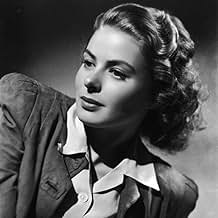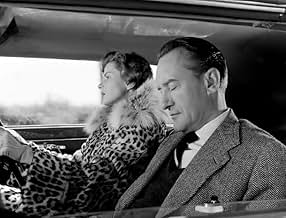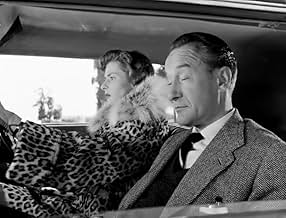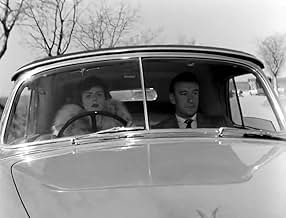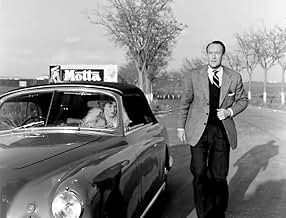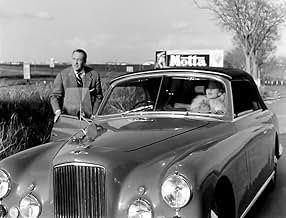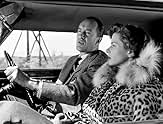VALUTAZIONE IMDb
7,3/10
13.313
LA TUA VALUTAZIONE
Una coppia infelicemente sposata cerca di trovare direzione e intuizione durante una vacanza a Napoli.Una coppia infelicemente sposata cerca di trovare direzione e intuizione durante una vacanza a Napoli.Una coppia infelicemente sposata cerca di trovare direzione e intuizione durante una vacanza a Napoli.
- Regia
- Sceneggiatura
- Star
- Premi
- 3 vittorie totali
George Sanders
- Alex Joyce
- (as Georges Sanders)
Maria Mauban
- Marie
- (as Marie Mauban)
Anthony La Penna
- Tony Burton
- (as Leslie Daniels)
Natalia Ray
- Natalie Burton
- (as Natalia Rai)
Bianca Maria Cerasoli
- Un'amica di Judy
- (non citato nei titoli originali)
Adriana Danieli
- Un'amica di Judy
- (non citato nei titoli originali)
María Martín
- Judy
- (non citato nei titoli originali)
Lyla Rocco
- La signora Sinibaldi
- (non citato nei titoli originali)
Recensioni in evidenza
This is the film that Truffaut writing for Cahiers proclaimed 'the first modern film', going on to praise Rossellini as the father of New Wave. If we don't want to be stridently literal about these things, I agree with him. A bunch of filmmakers who changed the face of cinema in the 60's are all connected to Rossellini and flow out from this film.
At the heart of it we have the familiar trope of a marriage falling apart, melodrama stuff. But modern, meaning understated and without the soaring emotion. We fill the gaps, providing our own understanding of how a relationship works. We participate as players.
So it's about this affair whose nothingness is revealed by the surrounding world, it withers away; the lavish villa with endless views of far horizon, the large, empty veranda where the two of them languish in comfortable lounge chairs. A little outside, it's the countryside of Naples that engulfs them with languid time and hot, lazy weather, a tabula rasa dotted with old ruins.
We're taken on a pilgrimage of these ruins, as the woman looking for a portent that will divine her predicament. The museum filled with statues, the old Roman fort, Vesuvius and Pompeii; Rossellini presents them as mute, ascetic images, images all pertaining to some austere representation into which the woman projects her own world coming to pass. None of them, of course, hold any answers, except as what they are - reminders of the perishable, impermanent world in which we try so hard to grow roots.
Meanwhile, back in Capri, the cynical husband is squandered in his own aimless voyage for something that will fill the time. He courts a woman, much like he did his wife perhaps all those years ago. He feigns and thrusts for desire. Finally he returns home with the same void gnawing inside. Passable stuff, as in La Notte some years later, but the important stuff is with the woman's journey; the Stromboli part of the film as it were.
It is all about the painful process by which ruins are made, time into memory. We are privy to one such enactment in ancient Pompeii (then still being excavated): into the hole once occupied by a dead body, that holds nothing now and is hollow except with shape, the archaeologists pour plaster in order to surmise the shape of that past. Yet what they retrieve is merely the replica of empty space.
Oh, there's the stupidly saccharine finale, no doubt imposed once again on Rossellini by his Italian distributors at Titanus. It's something to be on the lookout for, for how marvelously Rosssellini confounds his censors.
As the couple magically decide they finally love each other, the mob of peasants that surrounds them - participating in some local religious ceremony - cries out in jubilee about 'il miracolo!'. The two lovers are swept aside by people rushing to see, reunited in this nonsensical miracle. The final shot is of police offers looking stern as they inspect the scene, like the censors would the film. Whether or not we choose to accept the one miracle, boils down to whether or not we would the other.
I want to summarize Rossellini here; he's largely forgotten now - probably because when the cinema he envisioned finally took hold, he had already abandoned it. But he's one of the most important filmmakers we have known. You find out that so much of what eventually blossomed with film, grew first roots with him. His transcendent vision was exceptional.
The only misgiving - slight, very slight - is that everything is relatively precise with meaning. Empty space abounds here, the pure ascetic images, yet is mostly filled for us. We're left with simply unearthing the cast, reading the signs. Perhaps I'm saying this because he envisioned so far ahead that I'm comparing him in my mind with later filmmakers who abstracted deeper. No matter, Rossellini ushered cinema far enough.
Now it would be Antonioni's turn to shoulder it; he would supply the breathing, incomplete space into which the imagination can pour into. There is no cast that explains away with him, only the means of immersion into a space empty, waiting-to-be-filled with us (not by us). The ensuing voyage that finally brings us to The Passenger is one of the most fascinating that I know of, but that is covered elsewhere.
At the heart of it we have the familiar trope of a marriage falling apart, melodrama stuff. But modern, meaning understated and without the soaring emotion. We fill the gaps, providing our own understanding of how a relationship works. We participate as players.
So it's about this affair whose nothingness is revealed by the surrounding world, it withers away; the lavish villa with endless views of far horizon, the large, empty veranda where the two of them languish in comfortable lounge chairs. A little outside, it's the countryside of Naples that engulfs them with languid time and hot, lazy weather, a tabula rasa dotted with old ruins.
We're taken on a pilgrimage of these ruins, as the woman looking for a portent that will divine her predicament. The museum filled with statues, the old Roman fort, Vesuvius and Pompeii; Rossellini presents them as mute, ascetic images, images all pertaining to some austere representation into which the woman projects her own world coming to pass. None of them, of course, hold any answers, except as what they are - reminders of the perishable, impermanent world in which we try so hard to grow roots.
Meanwhile, back in Capri, the cynical husband is squandered in his own aimless voyage for something that will fill the time. He courts a woman, much like he did his wife perhaps all those years ago. He feigns and thrusts for desire. Finally he returns home with the same void gnawing inside. Passable stuff, as in La Notte some years later, but the important stuff is with the woman's journey; the Stromboli part of the film as it were.
It is all about the painful process by which ruins are made, time into memory. We are privy to one such enactment in ancient Pompeii (then still being excavated): into the hole once occupied by a dead body, that holds nothing now and is hollow except with shape, the archaeologists pour plaster in order to surmise the shape of that past. Yet what they retrieve is merely the replica of empty space.
Oh, there's the stupidly saccharine finale, no doubt imposed once again on Rossellini by his Italian distributors at Titanus. It's something to be on the lookout for, for how marvelously Rosssellini confounds his censors.
As the couple magically decide they finally love each other, the mob of peasants that surrounds them - participating in some local religious ceremony - cries out in jubilee about 'il miracolo!'. The two lovers are swept aside by people rushing to see, reunited in this nonsensical miracle. The final shot is of police offers looking stern as they inspect the scene, like the censors would the film. Whether or not we choose to accept the one miracle, boils down to whether or not we would the other.
I want to summarize Rossellini here; he's largely forgotten now - probably because when the cinema he envisioned finally took hold, he had already abandoned it. But he's one of the most important filmmakers we have known. You find out that so much of what eventually blossomed with film, grew first roots with him. His transcendent vision was exceptional.
The only misgiving - slight, very slight - is that everything is relatively precise with meaning. Empty space abounds here, the pure ascetic images, yet is mostly filled for us. We're left with simply unearthing the cast, reading the signs. Perhaps I'm saying this because he envisioned so far ahead that I'm comparing him in my mind with later filmmakers who abstracted deeper. No matter, Rossellini ushered cinema far enough.
Now it would be Antonioni's turn to shoulder it; he would supply the breathing, incomplete space into which the imagination can pour into. There is no cast that explains away with him, only the means of immersion into a space empty, waiting-to-be-filled with us (not by us). The ensuing voyage that finally brings us to The Passenger is one of the most fascinating that I know of, but that is covered elsewhere.
Seems long and drawn out until you get to the final moment which is a marvellous thing, then you realise how great a film it was, in hindsight.
Possibly influenced Bunuel - some of the tree lined avenues and the religious saturation of a culture, the slowness of the story, it all reminded me of Bunuel. It's also acknowledged to be an influence on Godard's Contempt and it was interesting to see how it inspired parts of that film - the estranged couple cast against stunning Italian Neapolitan scenery. Must be a great story for it to have been filmed so well twice.
Possibly influenced Bunuel - some of the tree lined avenues and the religious saturation of a culture, the slowness of the story, it all reminded me of Bunuel. It's also acknowledged to be an influence on Godard's Contempt and it was interesting to see how it inspired parts of that film - the estranged couple cast against stunning Italian Neapolitan scenery. Must be a great story for it to have been filmed so well twice.
Katherine (Ingrid Bergman) and Alex Joyce (George Sanders) are on vacation in Italy. It's been eight years of marriage and they feel like strangers to each other.
This is scenes from a marriage and a road trip to personal discovery. It's meandering but that's perfectly fine. It's meant to be. Director Roberto Rossellini inadvertently starts a new movement in looser story telling in films. It's jazz when music has been all classical. The only ill-fitting aspect is the glamor of Ingrid Bergman. It's not a big thing or even a bad thing. She cannot be less than the movie superstar beauty that she is. It takes me out of the movie sometimes although there is an autobiographical suggestion within these characters. It takes away from their everyday struggles within their relationship. I do wonder if an average looking couple would make this an even more compelling examination into a marriage. I also wonder if the couple should stay together throughout the movie so that they can fill out their relationship more. I want them to talk this out together from start to finish.
This is scenes from a marriage and a road trip to personal discovery. It's meandering but that's perfectly fine. It's meant to be. Director Roberto Rossellini inadvertently starts a new movement in looser story telling in films. It's jazz when music has been all classical. The only ill-fitting aspect is the glamor of Ingrid Bergman. It's not a big thing or even a bad thing. She cannot be less than the movie superstar beauty that she is. It takes me out of the movie sometimes although there is an autobiographical suggestion within these characters. It takes away from their everyday struggles within their relationship. I do wonder if an average looking couple would make this an even more compelling examination into a marriage. I also wonder if the couple should stay together throughout the movie so that they can fill out their relationship more. I want them to talk this out together from start to finish.
A masterwork. Heeding Martin Scorsese's advice during his documentary MY VOYAGE TO ITALY, I was finally able to see an English language version of this film on a Brazilian DVD release and the experience was an exhilarating one. The story of a couple on the verge of destruction, surrounded by the vestiges of Pompeii and a view of Vesuvius, is at once real and mesmerizing, and the captivating moment of truth presented in the finale is a stirring revelation. It's easy to see how this film pointed the way for the studied new wave romances to come, like Michelangelo Antonioni's L'AVVENTURA, Godard's CONTEMPT and even Stanley Donen's TWO FOR THE ROAD.
Few films have inspired as much critical folderol as "Journey to Italy". Godard considered it a masterpiece, which is always a cause for worry; he had a sharp eye for directing technique, but not so much for storytelling. "Journey to Italy" reflects this defect, and cannot be called a masterpiece without caveat.
The title is certainly accurate. We follow Alex (George Sanders) and Katherine Joyce (Ingrid Bergman) on a journey through Italy, on their way to sell a mansion Alex' uncle left him, and enjoy some time together.
Their marriage is unhappy. We gather as much from the opening scene, when Alex requests that he drives instead of Katherine. Why so? To keep him awake, he says. Clearly, that's not the whole truth. He may think lowly of her driving skills. Or maybe he can't abide her being in control. Or is he really just bored? It's hard to tell with a sarcast like Sanders.
Katherine feels uncomfortable too, but doesn't call her husband out directly. 'It didn't occur to me that it'd be so boring for you to be alone with me,' she says instead. 'What's that got to do with it? I'm just bored because I've got nothing to do,' Alex replies. Neither is saying what they wanted to say.
That is "Journey to Italy" in a nutshell. Alex and Katherine's marriage could be saved if ever the two were honest with each other, but their emotional defences block every attempt. The tragedy is not that the two don't see what is happening. The tragedy is that they do, and fail to change their ways. Once living with a person for a certain period to time, one cannot suddenly play straight. Alex and Katherine are stuck in vicious circle they have created for themselves.
Rosselini is partially successful in portraying this tragedy. The parts that play out like the above scene have been rightly praised for their bold, elusive storytelling. The best scenes are those in which nothing of apparent notice happens: Katherine takes three tourist tours (set to foreboding music); Alex goes to a party and fails to enjoy himself. What goes on in their heads is left to guess. Antonioni was undoubtedly inspired by "Journey to Italy" when he employed the same technique in his Trilogy ("L'avventura", "La notte", "L'eclisse") -- to greater effect.
Comparison between the directors shows where Rosselini falls short. Note how Antonioni always stays on the surface. He complements the superficial quibbles of his characters with crystal-clear images, and leaves digging to his viewers. Rossellini, meanwhile, wavers. One scene, his characters speak in those natural and shrouded sentences. The next, they indulge in syrupy Hollywood platitudes, or worse: voice-over narration, to directly tell the audience how they feel. The script feels schizophrenic, possibly reflecting its two screenwriters. It is bold and elusive as often as safe and uninvolving.
As such, "Journey to Italy" can only be recommended with reservations. That certain critics fail to provide these is a serious fault. Imagine the Michelin Guide awarding a restaurant three stars despite part of their dishes being undercooked. To appreciate "Journey to Italy", one must seek out the well-done bits.
The title is certainly accurate. We follow Alex (George Sanders) and Katherine Joyce (Ingrid Bergman) on a journey through Italy, on their way to sell a mansion Alex' uncle left him, and enjoy some time together.
Their marriage is unhappy. We gather as much from the opening scene, when Alex requests that he drives instead of Katherine. Why so? To keep him awake, he says. Clearly, that's not the whole truth. He may think lowly of her driving skills. Or maybe he can't abide her being in control. Or is he really just bored? It's hard to tell with a sarcast like Sanders.
Katherine feels uncomfortable too, but doesn't call her husband out directly. 'It didn't occur to me that it'd be so boring for you to be alone with me,' she says instead. 'What's that got to do with it? I'm just bored because I've got nothing to do,' Alex replies. Neither is saying what they wanted to say.
That is "Journey to Italy" in a nutshell. Alex and Katherine's marriage could be saved if ever the two were honest with each other, but their emotional defences block every attempt. The tragedy is not that the two don't see what is happening. The tragedy is that they do, and fail to change their ways. Once living with a person for a certain period to time, one cannot suddenly play straight. Alex and Katherine are stuck in vicious circle they have created for themselves.
Rosselini is partially successful in portraying this tragedy. The parts that play out like the above scene have been rightly praised for their bold, elusive storytelling. The best scenes are those in which nothing of apparent notice happens: Katherine takes three tourist tours (set to foreboding music); Alex goes to a party and fails to enjoy himself. What goes on in their heads is left to guess. Antonioni was undoubtedly inspired by "Journey to Italy" when he employed the same technique in his Trilogy ("L'avventura", "La notte", "L'eclisse") -- to greater effect.
Comparison between the directors shows where Rosselini falls short. Note how Antonioni always stays on the surface. He complements the superficial quibbles of his characters with crystal-clear images, and leaves digging to his viewers. Rossellini, meanwhile, wavers. One scene, his characters speak in those natural and shrouded sentences. The next, they indulge in syrupy Hollywood platitudes, or worse: voice-over narration, to directly tell the audience how they feel. The script feels schizophrenic, possibly reflecting its two screenwriters. It is bold and elusive as often as safe and uninvolving.
As such, "Journey to Italy" can only be recommended with reservations. That certain critics fail to provide these is a serious fault. Imagine the Michelin Guide awarding a restaurant three stars despite part of their dishes being undercooked. To appreciate "Journey to Italy", one must seek out the well-done bits.
Lo sapevi?
- QuizGeorge Sanders, in his 1960 autobiography, wrote at length about the making of this film, which he found an exasperating and unpleasant experience. He spoke witheringly about Roberto Rossellini, whom he characterized as being more interested in scuba diving than in film-making. Although the tone of his remarks is one of amusement, it became known that Sanders (who had admired earlier Rossellini films) had been deeply affected by exposure to a style of film-making quite foreign to his previous experience, and had spent the shoot feeling frustrated and angry, often bursting into uncontrollable tears.
- BlooperAfter deciding to leave Pompeii and walking down the stairs for the exit, the arm and shoulder of a crew member appear in the lower right side of the screen.
- Citazioni
Alex Joyce: What noisy people! I've never seen noise and boredom go so well together.
Katherine Joyce: Oh I don't know, Uncle Homer lived here for 40 years without getting bored.
Alex Joyce: Uncle Homer was not a normal person.
- ConnessioniEdited into Histoire(s) du cinéma: Fatale beauté (1994)
I più visti
Accedi per valutare e creare un elenco di titoli salvati per ottenere consigli personalizzati
- How long is Journey to Italy?Powered by Alexa
Dettagli
Botteghino
- Lordo in tutto il mondo
- 20.072 USD
- Tempo di esecuzione
- 1h 25min(85 min)
- Colore
- Mix di suoni
- Proporzioni
- 1.37 : 1
Contribuisci a questa pagina
Suggerisci una modifica o aggiungi i contenuti mancanti


